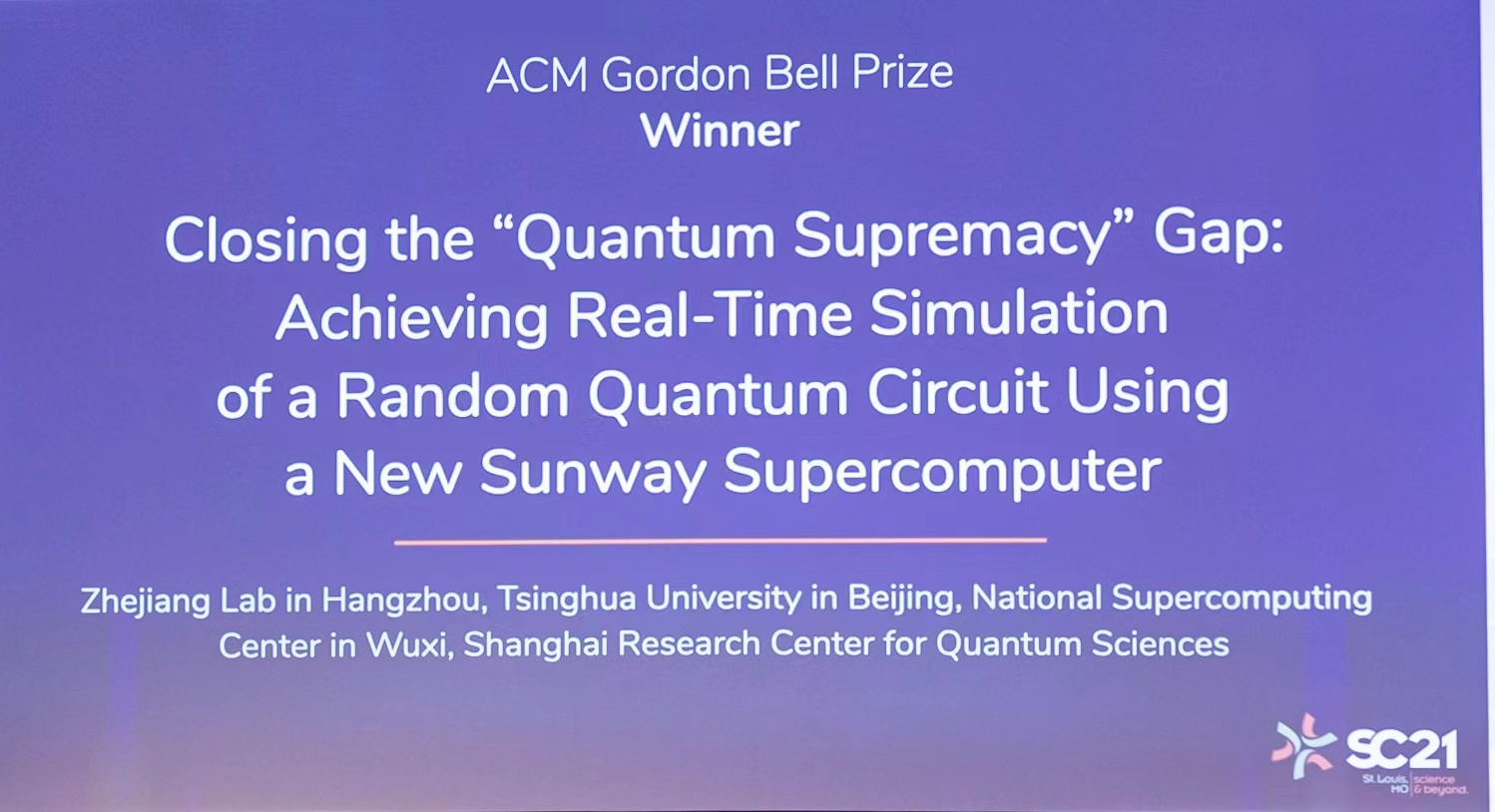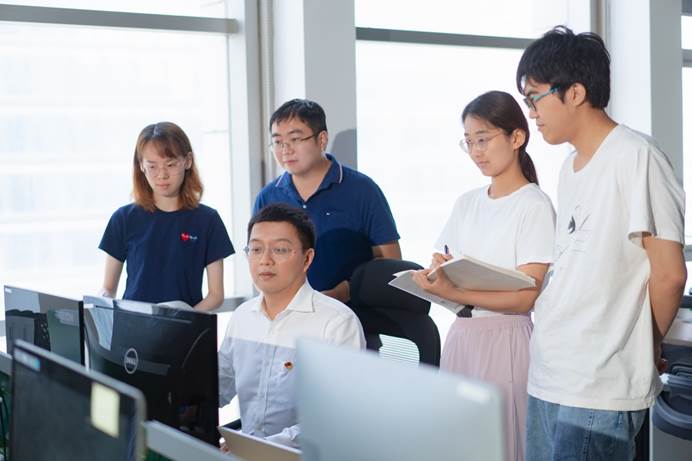On the afternoon of November 18, US time, the winning team of the Gordon Bell Prize in 2021 was announced at the International Supercomputing Conference (SC21) in St. Louis, Missouri. The Chinese supercomputing team won this honor for its achievement “Closing the Quantum Supremacy Gap: Achieving Real-Time Simulation of a Random Quantum Circuit Using a New Sunway Supercomputer” (SWQSIM). The members of the winning team are: Liu Yong, , Liu Xin, Li Fang, Yang Yuling, Song Jiawei, Zhao Pengpeng, Wang Zhen, Peng Dajia and Chen Huarong of the Zhejiang Lab, Hangzhou and the National Supercomputing Center in Wuxi; Fu Haohuan and Chen Dexun of Tsinghua University, Beijing, and the National Supercomputing Center in Wuxi; Wu Wenzhao of the National Supercomputing Center in Wuxi; and Huang Heliang and Guo Chu of the Shanghai Research Center for Quantum Sciences, of whom Liu Xin, Fu Haoheng, Guo Chu and Chen Dexun are the co-corresponding authors.
The Tsinghua Supercomputing Team, as part of the core members, won the prize for the third time. The main contributions of the Tsinghua team include the design and review of the research framework, and the performance optimization of complex tensor in quantum circuit simulation.

Award-winning project
Based on a new generation Sunway Supercomputer, the research team has developed the quantum computing simulator SWQSIM, and proposed the nearly optimal parallel splitting and shrinking method of tensor network and the mixed precision algorithm, which can be efficiently extended to tens of millions of cores in parallel scale and provide the sustained computing performance of 4.4 exaflops of mixed-precision, which is the highest mixed precision floating-point computing performance currently known in the world in the field of supercomputing. Compared with Sycamore’s speed of 200 seconds to sample one instance of a quantum circuit a million time, it takes 10,000 years for Summit to complete the simulation of the same complexity, while SWQSIM can get one million correlated samples with higher fidelity within 304 seconds, and get the same number of uncorrelated samples within one week, breaking the quantum hegemony that Sycamore has claimed. The software can also complete the simulation of quantum circuit more than 1000 times more complicated than that of Sycamore within 60 hours, and realize the single amplitude and multi-amplitude simulation of 100 ~ 400-bit quantum circuit algorithm, providing solid simulation support for the future development of quantum computing.

Fu Haohuan (second from left) and Wu Wenzhao (first from right) and other team members discuss the optimization scheme
Fu Haohuan, a co-corresponding author of this project, is Professor of the Department of Earth System Science, Tsinghua University and Deputy Director of the National Supercomputing Wuxi Center. He introduced, “The fidelity of complex quantum circuits is now still relatively low. With Google’s Sycamore system, for example, of one million samples, only about 2,000 valid samples can be guaranteed. A quantum circuit simulator with near-real-time simulation capability like SWQSIM can provide a powerful support for the future development of quantum computers. On the other hand, for traditional supercomputers, the ‘Quantum Supremacy’ developed by new quantum computers, as we have noted in our paper, provide good examples for us learn from. The realization of solving such a highly complex problem in traditional supercomputing has inspired the team’s innovations in algorithms, parallel methods, optimization methods and so on. Of course, what we value more is to truly build a bridge between the most advanced quantum computers and the most advanced supercomputers, so that they can promote each other and even integrate with each other.”
Wu Wenzhao of the National Supercomputing Wuxi Center, a member of the prize-winning team, noted that the award-winning research results surpassed the world’s best level of random quantum circuit simulation by far, and reflected the strength of the new generation Sunway Supercomputer, which is of great significance for supporting the research and development of future quantum systems and accelerating the design and process of more complex and practical quantum computing systems. Wu Wenzhao, who pursued his postgraduate studies in the Department of Earth System Science, Tsinghua University, under the guidance of Professor Fu Haohuan, has been working with the National Supercomputing Wuxi Center since his graduation. Since 2020, he has been responsible for the development of the deep learning framework of the Sunway platform. When talking about the relationship between knowledge and practice, Wu said, “During my studies in the Department of Earth System Science, the department always encouraged interdisciplinary studies, so that I could constantly try to apply what I had learned to new fields.”
The Gordon Bell Prize is the highest award in the field of international high-performance computing applications. In 2016 and 2017, the solver of atmospheric dynamic equations which Prof. Fu had participated and the nonlinear earthquake simulation work which Prof. Fu had spearheaded won the Gordon Bell Prize, for having effectively realized the large-scale parallel expansion of the model and greatly improved the spatial-temporal resolution and the ability to describe key phenomena. As a result, China realized breakthroughs in winning the prize for the first time and then winning it again the next year.
Written by Wang Jiayin
Photos by Fu Haohuan
Checked by Fu Haohuan and Huang Xiaomeng